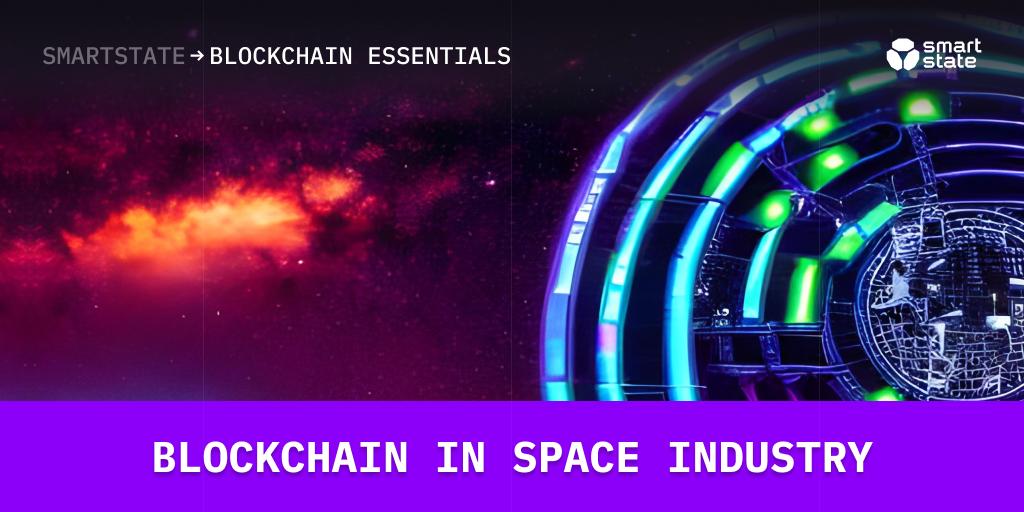Blockchain in Space industry
Taking a look at the history of science-fiction literature, there is hardly any writer who’s never dreamt of advanced civilizations occupying deep space (no matter, terran or alien), their advanced technologies and easy access to information and assets. Let us be science-fiction dreamers and imagine our own future, however it could look, but with obligatory features… blockchain and crypto.
Lots of benefits can be imagined thinking about the future. First of all, blockchain will help to store, process and secure enormous amounts of data. It will provide security and transparency of the logistics, shipping and supply chain and provide secure access to them from any point in space, howeven remote. Access to resources will be simplified in the environment where there is no tight connection to one or another national fiat currency. Blockchain can help to analyze, foretell and evaluate risks as it helps to take all possible threat factors into account. Asset and actives’ tokenization will help to build supply chains and exchange resources in an easier and more convenient way.
…and what’s the reality?
There are various projects already underway. PWC (PriceWaterhouseCoopers) analyzed potential benefits of blockchain for the space industry (such as tokenization, procurement and satellite communication).
Several companies worldwide became pioneers in blockchain innovations and start-ups concerning the space industry. SpaceChain based in the UK and Singapore is creating a specific satellite chain based on blockchain technology, which can be used for developing open-source operating systems and blockchain applications. It was the first time when blockchain and space science blended together. The CubeSats launch took place on February, 2nd, 2018, which became one of the first milestones in space and blockchain world history.
Qtum put forward an idea of mining crypto in space. Blockstream is working on the support of operations with Bitcoin in space, at the same time aiming at providing individuals who have lost connection due to technical failure with the ability to make transactions. In 2018 they have already been using four satellites which covered six footprints (including Asian and Pacific areas). Although, using this network currently requires connection to Bitcoin's own network to send transactions. ConsenSys Space created a database based on a blockchain to point out satellites’ positions, which turned out very useful for companies which launched fleets of satellites (such as SpaceX). It is the only non-governmental database of its kind (the other one is the property of the US Air Force). Blockchain technology can also be useful in creating entire satellite constellations (for example, to provide high-speed internet connection even in remote corners), however, this is more of an idea as of today.. At the same time some private companies (such as Virgin Galactic or Blue Origin) are going to use blockchain (especially Bitcoin and Ethereum) in their program of space tourism. They have plans to provide tourists with the ability to pay for the trips in cryptocurrency. BTC owners may become next passengers of SpaceShip Two by SpaceShip company, the trip will cost around 340 BTC.
The project supposes the use of blockchain for creation of a secure, decentralized infrastructure, which will help to work with huge amounts of data and facilitate data analysis of deep space exploration, as the document from Akron, Ohio points out. Development of SDN (Software-defined networking) will be carried out with the help of a blockchain to achieve a high level of infrastructure scalability.
On the other hand, not only the private sector is looking to use blockchain in astronomy. In 2017 NASA announced a grant for a spacecraft system based on blockchain. It was given to Jin Wei Kocsis for his project Resilient Networking and Computing Paradigm (RNCP). Some developers and explorers are looking forward to materializing this new paradigm for exploring space. All space objects (from satellites to asteroids) can be tokenized and manipulated by blockchain technology. Space objects can be handled by means of smart contracts and blockchain protocols, and moreover it can add more security, transparency and intelligence.
Another use of blockchain may be connected with TDRS system (Tracking and Data Relay Satellite). Blockchain can be used to optimize user queries from the system by synchronizing and managing connection patterns. Users can send specific request patterns to the system by entering requests into the blockchain, which are then stored there as ‘user request digital tokens’.
As the short but bright history shows, NASA and private companies are on the same wave, counting upon blockchain technology to improve space networking and further attempts to explore deep space mysteries.
Main advantages of tokenization in space
According to specialists there are three main advantages of using tokenization of space assets.
- Greater control over the assets. Wrapping space assets into secure tokens can enhance tracking, processing, verifying and securing space assets and manipulate them via smart contracts.
- Faster transaction and automated compliance. Smart contracts can help to improve automatic transaction patterns of satellite to satellite, ground station to satellite and satellite to ground station, user to satellite and satellite to user, ground stations between each other, astronauts between each other and the like. The time of response and sending messages will be much shorter and transactions can be managed in real time.
- Security. Decentralization, provided by blockchain, will eliminate the risks which plague traditional models of space communication. Space assets on a blockchain are encrypted and therefore tamper-proof. Space companies can also track and monitor their craft with more transparency. With the help of blockchain space agencies can detect attacks on satellite systems.
However, not everyone is so optimistic about the blending of space explorations and crypto. There are skeptics, who are not ready to believe cryptocurrency will help to expand and develop the economy on Mars or that mining can be possible there (for example, due to too long distances and low hashrate). But how will it be in the near future? Let's wait and see…

